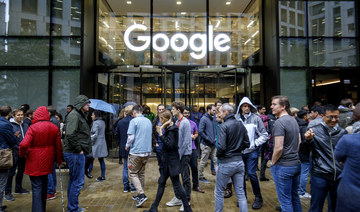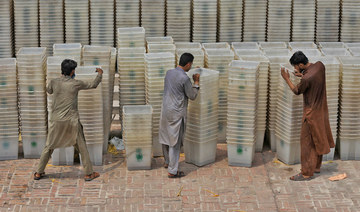DUBAI: A cookie is essentially a tag or piece of code placed on any online content — such as an article, video or advertisement — that collects user data. The data collected includes information like the device ID, and the internet usage and browsing habits of a user. It cannot, however, collect any personal data such as a user’s gender, age or name. This data can then be used by publishers to tailor their content offerings and by brands to launch targeted advertising.
Although cookies do not collect personal data, over time, due to the sheer volume of cookies and the time an average user spends across their devices, brands and publishers can start to paint a picture of the person behind the device ID. For example, if a particular ID is engaging with more female content while shopping for beauty products, a publisher or analytics company can begin creating a profile and pushing tailored content and advertising to that ID.
Cookies not only follow users as they traverse through the internet across their devices, but the user data collected from them is then sold and monetized — something users have become increasingly uncomfortable about.
“There has been a reckoning when it comes to privacy building for the last few years,” Nader Bitar, deputy general manager of advertising technology company MMP Worldwide, told Arab News.

Last year, Apple blocked third-party cookies on its Safari browser, while Google is still in the process of blocking cookies on Chrome, with plans to phase them out entirely by next year.
Apple’s iOS 14 update also requires app developers to meet specific privacy requirements before they can be listed on the App Store, and gives users control over apps tracking their movement online and sharing their data with third-party companies.
“Most people never really understood how much information they were giving away about themselves for free, and how much money was being made off the back of this data,” Sarah Messer, managing director at Nielsen Media MENAP, told Arab News.

Typically, cookies cannot identify an individual, but the likes of Facebook know exactly who each user is and thus gain access to a much richer data profile which they use to make money, Messer said, adding: “But people don’t want that.”
The death of cookies is a victory for user privacy, but has thrown marketers into panic mode. “Advertisers have been left in limbo for a while as the goalposts surrounding user privacy began to shift even before the pandemic,” said Bitar.
Nielsen’s Digital Ad Ratings tool, which measures the on-target performance of online advertising, relied on cookies and worked across all web platforms including so-called “walled gardens” with closed ecosystems, such as Facebook and YouTube. One of the world’s biggest advertisers, Procter & Gamble, would ask all online publishers to place the Nielsen cookie on all their advertising in order to measure performance.
Without cookies, brands like P&G are reliant on data from publishers to measure the performance of their ads — lacking any third-party verification from companies such as Nielsen. “All the big digital publishers would say we have a ‘walled garden’ and you can only have the data that we allow you to have, and it’s really them that are then leading the charge in a cookie-less world,” said Messer.
Although Apple’s privacy changes are a massive boon to customers, “Apple is not doing it out of the goodness of their heart,” said Bitar.
“They are, in effect, creating their own walled garden to keep users within their own ecosystem and forcing everyone else to get on board. The advantage Apple and Google have in this space is astounding, and between them, they have upended digital advertising as we know it,” he added.
Messer, on the other hand, believes that “everybody wants a transparent media industry.” She said that the likes of Google are inviting companies such as Nielsen into their walled gardens. “This is very much about respecting consumer privacy, and not about trying to close the doors, because they’re actually inviting people like us in to come and have those conversations with them.”
Now, Nielsen is working with companies including Facebook and YouTube to set up technology on their platforms, which will enable them to receive independent third-party data without cookies. When it comes to other publishers that are not walled off, Nielsen and similar measurement companies are setting up “identity panels,” Messer said. Traditionally, an online panel in the UAE would consist of 60,000 to 70,000 people, but an identity panel is much larger, with ideal numbers of about 150,000 to 200,000 people.
“We will know the identities of people within this panel, and we will use it as proxy data and apply it to what we see on the rest of the web,” she added.
“This evolution of identity panels is what will replace cookies and tags,” she said. However, the biggest disadvantage of losing cookies is the accompanying loss of accuracy.
“In a world where we had the entire Facebook audience of about 8.4 million people in the UAE — the entire population in a dataset — we really understood the data,” said Messer. “We are then reducing that to about 200,000 people, so there will be some loss of accuracy.”
This loss can result in less relevant advertising, which in turn can become an annoyance for users. “Users don’t want their experience interrupted online with irrelevant ads, but they also want the right to shield their activity online from potential advertisers, which creates something of a Catch-22,” said Bitar.
While advertising’s relevancy may fall in the short term, consumers will likely see benefits through their lives and data being much more private. “I think that’s something that people want even if they don’t fully understand it,” said Messer.
Advertising often gets a bad rap for being intrusive and irritating, but it is worth remembering that “advertising isn’t bad when it’s done well, and actually anticipates and answers a need,” said Bitar.
Users want to feel valued, heard and understood, and according to Bitar, the only way to do that is to personalize, which means marketers “have to walk a fine line between being invasive and useful.”
He added: “I’m fine with my data being used to shape a better experience for me online as long as there is transparency from all parties involved. This is what will be at the heart of everything moving forward: An open and honest exchange.”


























